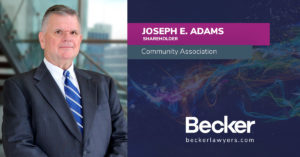 This week continues our review of the 2021 legislative changes affecting Florida community associations. Today we will cover Senate Bill 1966, which addresses budget procedures for condominium and cooperative associations, as well as two other bills of interest. These laws took effect July 1, 2021.
This week continues our review of the 2021 legislative changes affecting Florida community associations. Today we will cover Senate Bill 1966, which addresses budget procedures for condominium and cooperative associations, as well as two other bills of interest. These laws took effect July 1, 2021.
Section 718.112(d)2 of the Condominium Act has been amended to state that a person who is “delinquent” in the payment of any “assessment” is not eligible to be a candidate for the board. The previous version of the statute stated that a person who was delinquent in the payment of “any monetary obligation” to the association was ineligible. For example, someone who had not paid a fine could not run for the board under the previous statute, under the new law only assessment delinquencies can be used as the basis for disqualification.
This amendment also states that a person is “delinquent” if an assessment payment is not made by the due date set forth in the condominium documents. If a due date is not set in the condominium documents, the due date is the first day of the assessment period (month or quarter).
Section 718.112(f)1 of the Condominium Act was amended to require the board to adopt the annual budget at least 14 days prior to the start of the association’s fiscal year. Failure to comply can be the basis for a fine or other sanction from the state’s condominium regulatory agency. The same changes were made to Section 719.106(1)(j)1 of the Cooperative Act.
House Bill 649 deals with association petitions objecting to property tax assessments. Section 194.011(3)(e) of the Florida Statutes was amended to create specific notice requirements regarding petitions to a value adjustment board. Condominium or cooperative associations can appeal the decision and can defend an appeal taken by the property appraiser. This Bill also deals with other technical procedures and was enacted in response to a decision from a Florida appeals courts which had interpreted the statute to limit an association’s authority in this area.
Senate Bill 602 amended Chapter 617 of the Florida Statutes, the Florida Not for Profit Corporation Act. The most important change was an amendment to Section 617.0725. That law states that whenever articles of incorporation or bylaws require a vote to take an action, that provision can only be amended by the vote required to take the action, and not the vote required to amend the document. For example, if an association’s articles of incorporation state that a vote of 75 percent of all owners is required to permit the board of directors to borrow money, but the articles say they can be amended by a 67 percent vote, what is the vote required to amend the borrowing provision?
Under the previous law, there was substantial uncertainty and disagreement amongst lawyers as to the correct answer. Some argued the housing statutes control, some argued that the corporate statute control. This debate was laid to rest by this amendment, and the new provision of the corporate statute specifically exempts associations. Therefore, using our hypothetical example, the borrowing clause could be amended by a 67 percent vote.
This Bill also included a provision that removed associations from the provisions of the corporate statutes regarding committees, which had become rather complex and cumbersome. Finally, in a change that may do more harm than good, the corporate statute was amended to state that it does not apply to any issue which is “provided for” in the housing statute, whereas the previous version of the statute said the corporate law was inapplicable in the event of a “conflict.”
Next week we will continue our annual legislative review with a look at some new laws aimed at COVID liability, and their impact on community associations.
Joseph Adams is a Board Certified Specialist in Condominium and Planned Development Law, and an Office Managing Shareholder with Becker & Poliakoff. Please send your community association legal questions to jadams@beckerlawyers.com. Past editions of the Q&A may be viewed at floridacondohoalawblog.com.